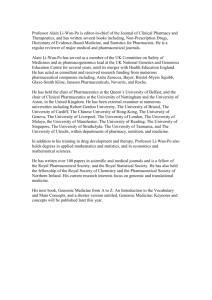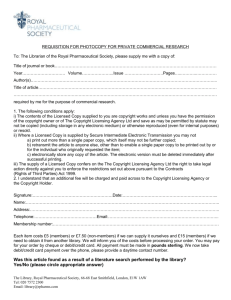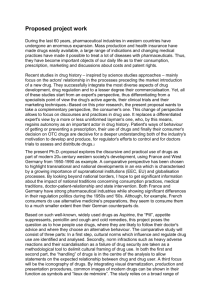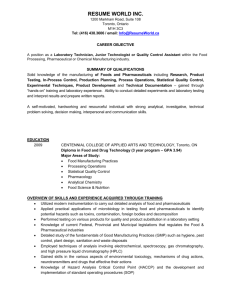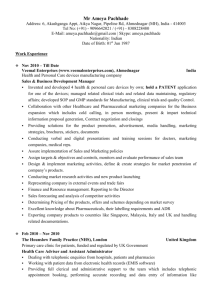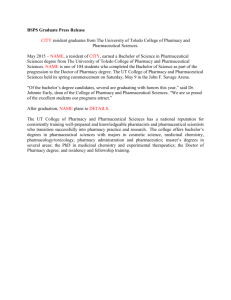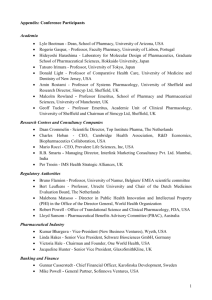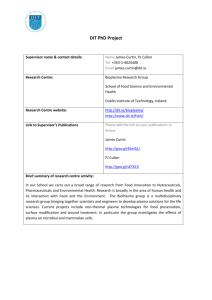pharmacy policy - Northwest Georgia EMS
advertisement
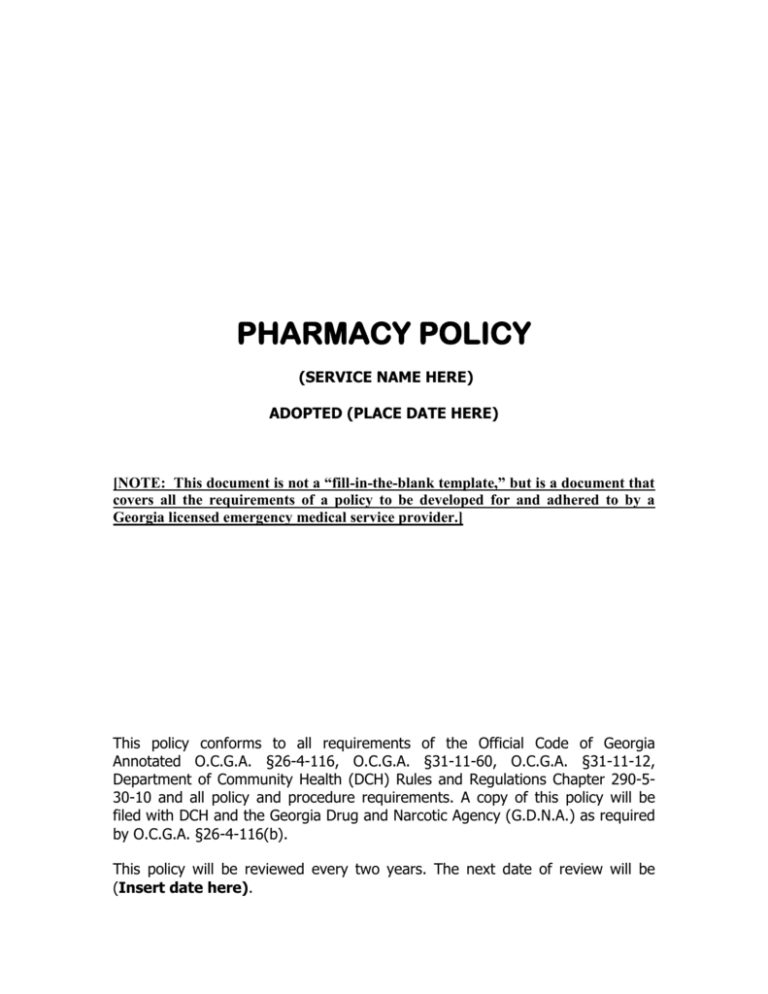
PHARMACY POLICY (SERVICE NAME HERE) ADOPTED (PLACE DATE HERE) [NOTE: This document is not a “fill-in-the-blank template,” but is a document that covers all the requirements of a policy to be developed for and adhered to by a Georgia licensed emergency medical service provider.] This policy conforms to all requirements of the Official Code of Georgia Annotated O.C.G.A. §26-4-116, O.C.G.A. §31-11-60, O.C.G.A. §31-11-12, Department of Community Health (DCH) Rules and Regulations Chapter 290-530-10 and all policy and procedure requirements. A copy of this policy will be filed with DCH and the Georgia Drug and Narcotic Agency (G.D.N.A.) as required by O.C.G.A. §26-4-116(b). This policy will be reviewed every two years. The next date of review will be (Insert date here). Procurement of Pharmaceuticals The medical director of this service is authorized by O.C.G.A. §26-4-116 (b), O.C.G.A. §31-11-12, DCH Rules and Regulations Chapter 290-5-30-.10 (1) and State Office of EMS and Trauma (SOEMS/T) Procedure PRO-D-01 to contract with a Georgia licensed pharmacy to furnish dangerous drugs and controlled substances for vehicles of this Georgia licensed service. A copy of the contract is attached, as Addendum A. Pharmaceutical shipments will be delivered to the medical director or to the contracted Georgia licensed pharmacy. A written record of all drugs issued to the medical director for the emergency service provider must be maintained by the issuing pharmacy and the emergency service provider for a period of two (2) years. O.C.G.A. §31-11-60(a) authorizes any Georgia licensed emergency medical technician (EMT), cardiac technician (CT) or paramedic (EMT-P) employed by a Georgia licensed Medical First Responder provider to obtain any substance which such person is authorized to administer by virtue of his/her license from a Georgia licensed hospital pharmacy which is contracted by the Georgia licensed Medical First Responder service as a provider of pharmaceuticals. Storage of Pharaceuticals The pharmaceuticals will be stored at the contracted Georgia licensed pharmacy or at locations selected by the service medical director. Each location selected by the service medical director must have a separate Drug Enforcement Agency (DEA) number and must meet all requirements for security, accountability and environmental control as outlined in O.C.G.A. §26-4-116 and DCH Rules and Regulations Chapter 290-5-30-.10 (2). If sealed drug and intravenous (IV) administration kits are not obtained at the contracted Georgia licensed pharmacy, then controlled access, environmentally controlled rooms, each with a separate DEA number, will be designated by the service medical director at various EMS provider bases. Only persons approved by the local medical director will have access into these pharmaceutical storage rooms by keyed lock, pass card or other means. The approved persons must have the pharmaceutical storage room under direct supervision at all times whenever the door is open. The door will be locked and secured at all other times. The room will be maintained at a temperature range which conforms to the manufacturers suggested storage temperature range for all pharmaceuticals stored in the room. A list of the minimum level the amount of pharmaceuticals to be stored in the pharmaceutical storage rooms will be approved and the list will be available in each pharmaceutical storage room. Records must be retained for two (2) years on pharmaceuticals delivered to the pharmaceutical storage room and be signed by the person receiving the shipment. 2 All pharmaceuticals, including controlled substances, dangerous drugs and IV fluids, must be placed in kits which are sealed with numbered pharmacy seals. The kits may also be locked if required by the service medical director. The pharmaceuticals must leave the pharmaceutical storage room or contracted Georgia licensed pharmacy only in sealed kits. A record must be kept for two (2) years with the following information on each kit provided to an employee of the Georgia licensed service: Seal Number Date Received Person receiving kit (print name, level and license number) Signature of person receiving kit Signature of person providing kit The pharmaceutical kits must have the name of the service on the outside of the kit with the following instructions: “If found call (telephone number of the service inserted here).” A kit expiration date must be placed on the outside of the kit indicating a date that the kit will be opened and inspected, which is before the date of the first drug expiring within the kit. A complete list of contents, including name of pharmaceutical, concentration of pharmaceutical and volume of pharmaceutical, must be placed inside the box and will be used as a guide to refill the kit and to insure accountability. The service medical director will determine the contents of all pharmaceutical kits based on the treatment protocols he/she approved for the service. The pharmaceutical kits shall not be left unattended on vehicles unless such vehicles are maintained in environmentally controlled boxes in the patient compartment or in the patient compartment when the compartment is maintained at a temperature within the range specified by pharmaceutical manufacturers, and such vehicles are locked. The theft of any pharmaceuticals must be reported immediately to the proper local and state authorities, including the Georgia Drug and Narcotic Agency, and the SOEMS/T. All out of service licensed vehicles will have the kits removed and placed in an area which conforms to DCH Rules and Regulations Chapter 290-5-30-.10(2). Use of Pharmaceuticals When the EMT, CT or Paramedic employed by the licensed service and while on-duty obtains a verbal or written order from a physician including treatment protocols approved by the service medical director to administer a pharmaceutical, the seal on the pharmaceutical kit will be broken and the kit will be opened. The seal will be placed in the kit and not discarded. Pharmaceuticals ordered will be administered according to the verbal or written order by the ordering physician to the patient(s) by the EMT, CT or Paramedic within the 3 scope of practice of the provider. The service treatment protocols approved by the service medical director will be the guide on administration of pharmaceuticals. A Georgia Patient Care Report (PCR) will be completed on each patient receiving a pharmaceutical and will serve as the certificate of disposition for all pharmaceuticals. The form will include, at a minimum, the following information: Name of patient(s) Name of pharmaceutical(s) administered Concentration of pharmaceutical(s) administered Volume of pharmaceutical(s) administered Ordering physician or protocol used Name, level, license number and signature of EMT, CT or Paramedic administering pharmaceutical Date and time of administration Route of administration Location of administration site on patient(s) Amount of pharmaceutical wasted Witness signature A physician, registered nurse OR a Georgia licensed EMT employed by the service (EMT, CT or Paramedic) must directly witness the wasting of all pharmaceuticals. This witness must sign the patient care report form attesting that they witnessed the wasting of the pharmaceutical. A narcotic control sheet must be completed for all controlled substances as required by Georgia Law. A copy of the Georgia Patient Care Report and narcotic control sheet must be placed in the kit for return to the contracted Georgia licensed pharmacy or the service Pharmaceutical storage room. The ordering physician must sign the form within 72 hours unless the order was issued by a designated base station facility, in which case the medical control patient log number will suffice. The EMS Service must retain a signed copy of the form for at least two (2) years. Pharmaceutical boxes must not be left open after pharmaceuticals are administered. The kits must be locked, placed in a locked compartment of the ambulance, or resealed with a pharmacy seal until it is inspected, refilled and resealed in the contracted Georgia licensed pharmacy or in the service pharmaceutical storage room. Multiple uses of a pharmaceutical kit, which has been unsealed, are discouraged. Each kit returned to the contracted Georgia licensed pharmacy or service pharmaceutical storage room will be checked for tampering. The contents will be compared with the list of contents and the list of pharmaceuticals documented as being administered on the Georgia Patient Care Report form(s) in the kit. Any discrepancies will be immediately reported to the pharmacist and the service medical director. 4 Each kit will be opened, inspected and all expired pharmaceuticals will be replaced at least every thirty (30) days. All expired pharmaceuticals will be returned to the manufacturer, used for training by the service or discarded in accordance with Environmental Protective Service policies and as advised by the supplying pharmacy. All pharmaceuticals used for training must be under the same controls as unexpired drugs and must be marked expired using a permanent marker. Inventory records must be retained for at least two (2) years. All kits which are damaged or have damaged pharmaceuticals will be returned immediately to the contracted Georgia licensed pharmacy or service pharmaceutical storage room and to be checked for contents against the list of contents. Each unusable damaged pharmaceutical will be recorded and reported to the pharmacy and the service medical director. Missing pharmaceuticals will also be reported. Inspections A pharmacist from the contracted Georgia Licensed pharmacy shall physically inspect the drugs of the service to determine compliance with this policy for the handling, storage, labeling and record keeping of all pharmaceuticals and will maintain these records for two (2) years. A copy of this inspection will be shared with the service medical director and will be available for inspection by the GDNA and EMS SOEMS/T. The SOEMS/T will include inspections of pharmaceuticals on all inspections of vehicles and services. A copy of this inspection will be provided to the service. Authority: This policy is approved and made effective on _________________, 20__ by _________________________________ Service Medical Director ____________ Date _________________________________ Pharmacist from supplying pharmacy ____________ Date _________________________________ Service Director ____________ Date 5
